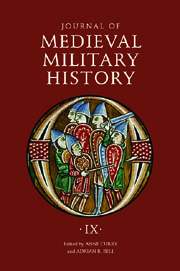Book contents
- Frontmatter
- Contents
- List of Illustrations
- Preface
- The French Offensives of 1404–1407 against Anglo-Gascon Aquitaine
- The King's Welshmen: Welsh Involvement in the Expeditionary Army of 1415
- Gunners, Aides and Archers: The Personnel of the English Ordnance Companies in Normandy in the Fifteenth Century
- Defense, Honor and Community: The Military and Social Bonds of the Dukes of Burgundy and the Flemish Shooting Guilds
- The Battle of Edgecote or Banbury (1469) Through the Eyes of Contemporary Welsh Poets
- Descriptions of Battles in Fifteenth-Century Urban Chronicles: A Comparison of the Siege of London in May 1471 and the Battle of Grandson, 2 March 1476
- Urban Espionage and Counterespionage during the Burgundian Wars (1468–1477)
- Urban Militias, Nobles and Mercenaries: The Organization of the Antwerp Army in the Flemish–Brabantine Revolt of the 1480s
- Military Equipment in the Town of Southampton During the Fourteenth and Fifteenth Centuries
- Journal of Medieval Military History 1477 545X
The King's Welshmen: Welsh Involvement in the Expeditionary Army of 1415
Published online by Cambridge University Press: 05 February 2013
- Frontmatter
- Contents
- List of Illustrations
- Preface
- The French Offensives of 1404–1407 against Anglo-Gascon Aquitaine
- The King's Welshmen: Welsh Involvement in the Expeditionary Army of 1415
- Gunners, Aides and Archers: The Personnel of the English Ordnance Companies in Normandy in the Fifteenth Century
- Defense, Honor and Community: The Military and Social Bonds of the Dukes of Burgundy and the Flemish Shooting Guilds
- The Battle of Edgecote or Banbury (1469) Through the Eyes of Contemporary Welsh Poets
- Descriptions of Battles in Fifteenth-Century Urban Chronicles: A Comparison of the Siege of London in May 1471 and the Battle of Grandson, 2 March 1476
- Urban Espionage and Counterespionage during the Burgundian Wars (1468–1477)
- Urban Militias, Nobles and Mercenaries: The Organization of the Antwerp Army in the Flemish–Brabantine Revolt of the 1480s
- Military Equipment in the Town of Southampton During the Fourteenth and Fifteenth Centuries
- Journal of Medieval Military History 1477 545X
Summary
The “myth”
The victory of the English at Agincourt is still frequently attributed in the popular consciousness to Welsh bowmen in their knitted Monmouth caps. The battle is undoubtedly part of a wider patriotic narrative in both England and Wales. The belief in the English victory being a result of Welsh efforts, though ubiquitous, is almost impossible to reference in a way that might satisfy the editor of an academic journal. A possible origin may lie in Shakespeare's Henry V (1599). The garrulous captain Fluellen reminds the king not of the number or importance of Welshmen in his army, however, but in that of his great-uncle, Edward the Black Prince, at Crécy. Contemporary accounts of Agincourt make very little mention of Welsh involvement. The Welsh chronicler Adam Usk notes the death of two men, one of them in error, as the first, Sir John Scudamore of Kentchurch, Herefordshire, in fact survived until 1435. The second, Dafydd ap Llywelyn ap Hywel of Brecon, better known as Dafydd or Davy Gam, Usk describes as “David Gam of Brecon.” The chronicle of Peter Basset and Christopher Hanson also notes the death of “Davy Gam esquire, Welshman.” Although Thomas Walsingham and the Great Chronicle of London also list Gam among the dead, they do not mention his origins or nationality. No chronicle or early history mentions the presence of Welsh archers at Agincourt, and nowhere in the extant corpus of fifteenth-century Welsh verse is the battle mentioned.
- Type
- Chapter
- Information
- Journal of Medieval Military History , pp. 41 - 64Publisher: Boydell & BrewerPrint publication year: 2011

